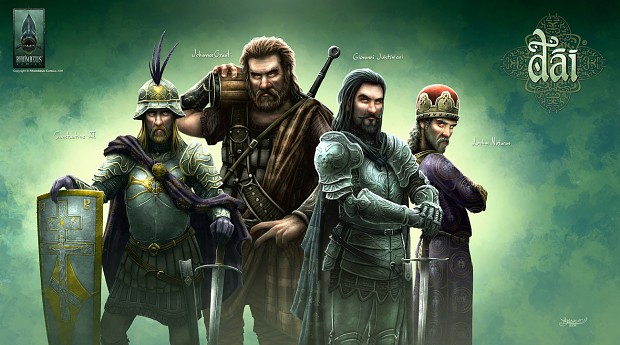Far left, Constantine XI: Constantine was the son of Emperor Manuel II, (Best known for his book, "Dialogue with a Persian") anda foreign Princess named Helena. Constantine was most notable for his defense of the Hexamilion, (Greek for "six mile wall.) against the Ottoman's. He was the Emperor present during the fall of Constantinople. An interesting fact is Constantine the Great's, (Who was considered first Emperor of the Byzantines)mother's name was also Helena.
Second from the left: Johannes Grant, (Or John Grant): Grant was an engineer in the service of the Empire at the time of the fall. His counter-tunneling techniques prevented Turkish troops form weakening or invading from under the walls. Greek and Latin accounts say he was German, but recent studies suggest that he could have been Scott, (As the Picture suggests) named John Grant.
Second from the left, Giovanni Giustiniani: A highborn Genoese Captain who lead a group of elite forces to Constantinope's aid. When the Turks broke through the walls, he lead the troops defending the breach bravely before being hit by an Ottoman cannonball (or a crossbow bolt) and being forced to retreat. He and some of his forces escaped, but Giovanni died of his wounds. Interesting enough, Giustiniani loosely means Justinian.
First on the right, Loukas Notaras: Constantine's second during the siege. Notaras led the troops along the north-western Sea Wall. He survived and was spared in exchange for the extensive riches he stored in Venice. But he was eventually executed. There are several accounts of why this happened but rather then tell my opinion, I'll let you read it yourself. En.wikipedia.org







The last heroes of the Byzantine Empire,fought for their country!